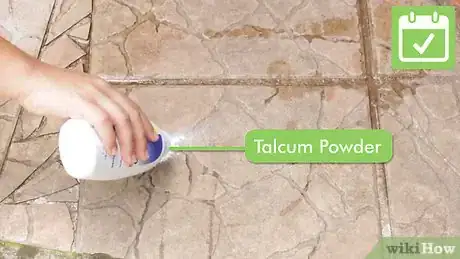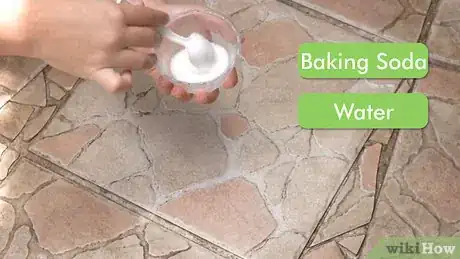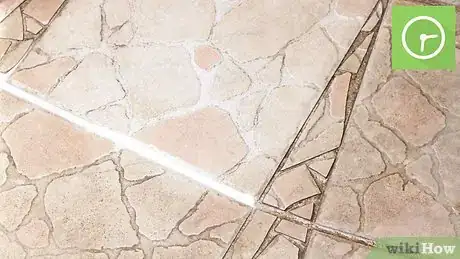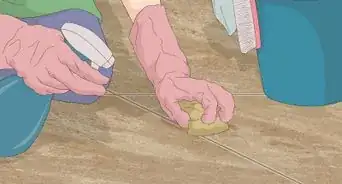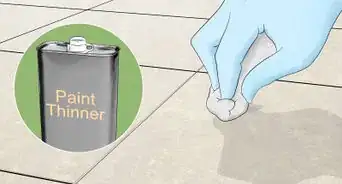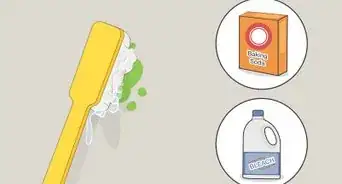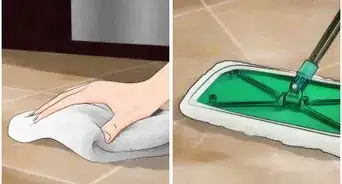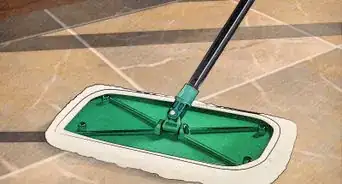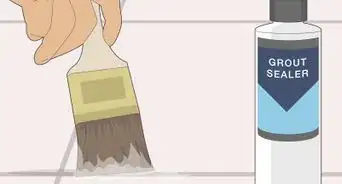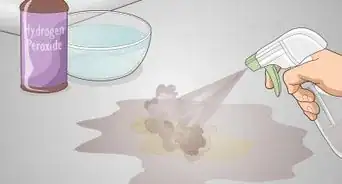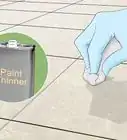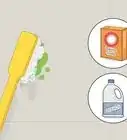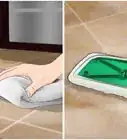This article was co-authored by Michelle Driscoll, MPH. Michelle Driscoll is the Owner of Mulberry Maids, which is based in Fort Collins, Colorado. With five years of experience, her business specializes in cleaning homes and small offices. She holds a Masters in Public Health from the Colorado School of Public Health. Additionally, Mulberry Maids has an A+ rating from the Better Business Bureau.
This article has been viewed 23,175 times.
Stone tile is durable and waterproof, which makes it a popular choice for flooring. Although it is a popular choice, stone tile needs to be cleaned often and maintained properly to remain in good condition. For a routine cleaning, you can do things like mop your floor with warm water and detergent. Spots should be attended to immediately, and the cleaner used for spots depends on what has been dropped. Along with the tile itself, the grout should be cleaned regularly for an overall clean and shiny floor.
Steps
Doing a General Cleaning
-
1Sweep the tile. Begin the cleaning process by sweeping the tile. Sweeping stone tile is especially important because it removes small particles, like sand, that can damage the floor. You can use any type of broom, but a dust mop is ideal because it helps the cleaning process go by faster.
- Do not drag furniture when moving it for cleaning the floor. Instead, have someone help you lift it and move it.
-
2Use a mop with dish soap. The easiest way to clean your tile is with a mop and dish soap. Use a few tablespoons (30-45 ml) of a pH-neutral dish soap instead of a harsh and acidic cleaner. Combine the cleaner with water in a bucket, and use a mop to wash down the floor until all of it has been cleaned.
- Seventh Generation and Method are a few brands of dish soap that you could use.
Advertisement -
3Rinse the floor. You can use the same bucket and mop you used to clean the floor, but make sure to rinse them out thoroughly. There shouldn’t be any detergent left. Fill the bucket with warm water. Use the mop to rinse the floor. Going over the tile with warm water prevents streaking caused by leftover cleaner.
- Rinsing the floor also helps to remove leftover sand and debris.
-
4Dry with a towel. Drying the floor by hand is better than allowing it to air dry because air drying can cause water spots. Grab a clean towel and dry the floor by hand. It takes a while, but it gives your floor the best result.
-
5Give the floor a shine. Complete the cleaning by giving your floors an added shine. There are several ways to do this. An easy way to do this is by using a few tablespoons (30-45 ml) of salt. Use the salt with a wet cloth and rub until the cloth is soft and dry. You can also use self-shining wax or extra virgin wax. [1]
- Avoid using too much wax or you could cause your floor to appear yellow. To remove excess wax, scrub with water and neutral soap, or use a wax remover.
- You can use black shoe polish for black stone.
Removing Spots from Stone Tile
-
1Clean the mess up immediately. Stone will soak up spills quickly because it is porous. The stains will be harder to remove the longer they are left. To prevent this, use a towel or other absorbent object to blot up the spill. Then, clean the spot thoroughly.[2]
-
2Use ammonia and water. This works well to remove stains caused by organic items, like coffee, food, leaves, and lichen. Mix a small amount of ammonia with water. Scrub with a sponge or soft cloth until the stain lifts. Then, dry the area with a clean towel.[3]
- Bleach can also be used, but it is not as good as ammonia because it is more corrosive.
-
3Remove rust with lemon juice and salt. Rust occurs when metal oxidizes during contact with stone. The rust stains can be lifted with lemon juice and salt. Pour some lemon juice and salt onto a clean cloth. Scrub with the cloth until the rust is gone. Immediately rinse the surface with water.[4]
- Lemon is acidic, so it should be removed as soon you’re done using it. Rinse with a lot of water and dry with a towel.
-
4Get rid of paint and ink stains. Paints and inks are more difficult to use because the cleaners for them are typically harsh. You can use mineral alcohol and a cloth to scrub off the stain. Methylene chloride can also be used, but it is dangerous.[5]
-
5Clean up fats with talcum powder. Fats from things like barbecues and candles can stain stone tile. Talcum powder can be used to remove the stains. Pour a fair amount of talcum powder on the stain and leave it for several days. Repeat the process again if the stain does not lift.[6]
Cleaning the Grouting
-
1Make a paste with baking soda and water. You will need to use baking soda and water. Combine the baking soda with a small amount of water. Add more water or baking powder if necessary until a paste is made.[7]
-
2Saturate the grout. Apply the paste directly to the grout. Use enough paste so that the dirty grout is saturated with the baking soda and water. The paste should only be applied to the grout. Do not put it on the tile.[8]
-
3Let the paste sit. The amount of time you allow the paste to sit depends on how dirty the grout is. If the grout is only slightly dirty, you can allow it to sit for a few hours. Allow the paste to sit overnight if the grout is very dirty.[9]
-
4Scrub the grout. Once you have let the paste sit, scrub the grout with a toothbrush. You may have to use a little force if the paste has hardened. Scrub until you see clean grout underneath.[10]
- If your grout is really dirty or if you have a lot of cleaning to do, you may wish to purchase a grout brush. Grout brushes have stiffer bristles than toothbrushes, so they can remove stubborn dirt more efficiently. You can get one for about $3 to $10 USD at a hardware or home supply store.
-
5Wash off the paste. Pour water onto the remaining paste. Rinse the grout off until all of the paste is gone. Use a towel to wipe off the paste. Dry with a towel.[11]
- You can use oxygen bleach on the grout if it doesn’t turn out as clean as you’d like after the paste.
Warnings
- Do not mix ammonia and bleach. The combination is dangerous when inhaled.[14]⧼thumbs_response⧽
- Avoid using cleaners that contain acid, like vinegar. Acids can stain the grout and damage the sealer on the floor.[15]⧼thumbs_response⧽
- Verify the stone material before cleaning it to avoid accidental damage. For example, you'll need to clean sandstone tile using less abrasive methods than you would use for harder stones.⧼thumbs_response⧽
Things You'll Need
- Dust mop
- Broom
- pH-neutral dish soap
- Water
- Bucket
- Towel
- Salt or self-shining wax
- Lemon juice
- Ammonia
- Mineral alcohol
- Baking soda
- Sponge
- Toothbrush or grout brush
References
- ↑ http://www.litosonline.com/en/articles/en/124/how-clean-natural-stone-house
- ↑ http://www.litosonline.com/en/articles/en/124/how-clean-natural-stone-house
- ↑ http://www.litosonline.com/en/articles/en/124/how-clean-natural-stone-house
- ↑ http://www.litosonline.com/en/articles/en/124/how-clean-natural-stone-house
- ↑ http://www.litosonline.com/en/articles/en/124/how-clean-natural-stone-house
- ↑ http://www.litosonline.com/en/articles/en/124/how-clean-natural-stone-house
- ↑ http://www.improvenet.com/a/diy-tips-for-cleaning-tile-floors
- ↑ http://www.litosonline.com/en/articles/en/124/how-clean-natural-stone-house
- ↑ http://www.improvenet.com/a/diy-tips-for-cleaning-tile-floors
- ↑ http://www.improvenet.com/a/diy-tips-for-cleaning-tile-floors
- ↑ http://www.improvenet.com/a/diy-tips-for-cleaning-tile-floors
- ↑ http://www.homeflooringpros.com/tile-natural-stone-floors/maintenance-care-cleaning/
- ↑ http://www.improvenet.com/a/diy-tips-for-cleaning-tile-floors
- ↑ http://www.litosonline.com/en/articles/en/124/how-clean-natural-stone-house
- ↑ http://www.homeflooringpros.com/tile-natural-stone-floors/maintenance-care-cleaning/
About This Article
To clean stone tile, start by sweeping your tile with a broom or dust mop to get rid of any dirt or small particles. Next, mop the floor with water mixed with a gentle, pH-neutral dish soap like Seventh Generation, which is easier on the surface, and dry the tile with a towel to prevent water spots. To make your stone tile shiny, pour some salt on the tile and rub it in with a wet cloth. Additionally, you can clean the grouting between tiles by creating a paste of baking soda and water, and scrub it clean with an old toothbrush. For more ways to clean stone tile, like how to use lemon juice to remove rust, read on!
